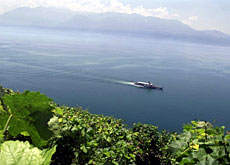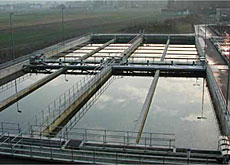Experts sound alarm over lake phosphate levels

Environmentalists are calling for action after Lake Geneva was found to contain three times more phosphates than in most other Swiss lakes.
But experts are divided over whether the substance should be banned from dishwashing detergents, which are blamed for some of the pollution.
The International Commission for the Protection of Lake Geneva said in a statement that immediate measures were needed to reduce the “excessive concentration of phosphates”.
The water lobby group revealed that in 2003 the lake contained 33 micrograms of phosphate per litre, adding that this level was three times higher than in most other Swiss lakes.
It says 33 tons of phosphates are washed into the lake from households every year – the same amount that is produced by agriculture.
Phosphate problem
Phosphates are commonly used in agriculture as fertilisers, but they are also found in many detergents.
They aid the growth of algae which gradually choke the lake by reducing the amount of oxygen in the water. This can have deadly consequences for fish.
Twenty years ago, the situation was so serious in many Swiss lakes that phosphates were banned from washing powder.
Although there has been an improvement since then, phosphates still remain a cause for concern.
“Phosphates are still today a real problem in many of the smaller lakes in Switzerland,” Edwin Müller of the Federal Environment Office told swissinfo.
Lake Zug has levels of up to 100 micrograms per litre – a record for the country.
Lake Geneva
According to Alfred Wüest from the Swiss Federal Institute for Environmental Science and Technology, Lake Geneva is badly affected because the surrounding region is densely populated, and there is a lot of agriculture and industry in the area.
“The region around Lake Geneva is used very intensively, and all these factors contribute to a higher level of phosphates in the lake,” he said.
Campaigners say they want to see Lake Geneva’s phosphate levels reduced to 20 micrograms per litre, which they say would enable the lake to rebalance itself.
To achieve this target, the International Commission for the Protection of Lake Geneva has dishwashing products in its sights.
Washing-powder ban
Despite banning phosphates in washing powder, Switzerland still allows phosphates in washing-up liquid and dishwasher powder but does set a limit of 2.5 grams per washing cycle.
The Swiss authorities are ruling out a similar phosphate ban to the one introduced for laundry detergents in 1985.
“At that time, the ban on phosphates in washing detergents was made law because there were appropriate alternatives,” said Müller. “This is not the case with dishwashing detergents.”
Neither type of detergent is banned in neighbouring France, leading to accusations that the country might also be responsible for Lake Geneva’s woes.
The lobby group says it is trying to encourage consumers to buy detergents with little or no phosphates. But surveys have shown these are hard to find in big retailers.
The supermarket chain, Migros, echoed Müller’s statement and questioned the impact of a possible ban on phosphate in washing-up products.
“[Such measures] would only have a very limited impact on the water quality of Lake Geneva,” Migros spokeswoman Monika Weibel told swissinfo.
Coop, the other leading retailer, only has phosphate-free dishwasher powder on sale in its main shops in the German-speaking part of the country.
“It is a reflection of the diverse consumer tastes in Switzerland,” said company spokesman Jörg Birnstiel.
But he said Coop’s attempts to launch its own brands of phosphate-free products were a failure and were withdrawn from sale a few years ago.
swissinfo, Philippe Kropf (translation: Isobel Leybold)
The level of phosphate in Lake Geneva is three times higher than in other Swiss lakes.
Clothes and dishwahing detergents and agricultural fertilizers are sources of phosphates.
In 1985 Switzerland imposed a ban on the substance in detergents for laundry.
Phosphate makes algae grow faster and depletes the water of oxygen.

In compliance with the JTI standards
More: SWI swissinfo.ch certified by the Journalism Trust Initiative



You can find an overview of ongoing debates with our journalists here . Please join us!
If you want to start a conversation about a topic raised in this article or want to report factual errors, email us at english@swissinfo.ch.